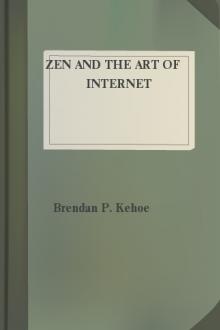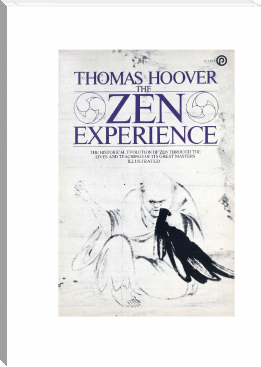Zen and the Art of Internet, Brendan P. Kehoe [top 100 novels TXT] 📗

- Author: Brendan P. Kehoe
- Performer: -
Book online «Zen and the Art of Internet, Brendan P. Kehoe [top 100 novels TXT] 📗». Author Brendan P. Kehoe
Was f@"ur pl@"undern!'' (What a place to plunder!'') Gebhard Leberecht Bl@"ucher
Usenet News
Original from: chip@count.tct.com (Chip Salzenberg) [Most recent change: 19 May 1991 by spaf@cs.purdue.edu (Gene Spafford)]
The first thing to understand about Usenet is that it is widely misunderstood. Every day on Usenet the ``blind men and the elephant'' phenomenon appears, in spades. In the opinion of the author, more flame wars (rabid arguments) arise because of a lack of understanding of the nature of Usenet than from any other source. And consider that such flame wars arise, of necessity, among people who are on Usenet. Imagine, then, how poorly understood Usenet must be by those outside!
No essay on the nature of Usenet can ignore the erroneous impressions held by many Usenet users. Therefore, this section will treat falsehoods first. Keep reading for truth. (Beauty, alas, is not relevant to Usenet.)
What Usenet Is
Usenet is the set of machines that exchange articles tagged with one or more universally-recognized labels, called newsgroups (or ``groups'' for short). (Note that the term newsgroup is correct, while area, base, board, bboard, conference, round table, SIG, etc. are incorrect. If you want to be understood, be accurate.)
The Diversity of Usenet
If the above definition of Usenet sounds vague, that's because it is. It is almost impossible to generalize over all Usenet sites in any non-trivial way. Usenet encompasses government agencies, large universities, high schools, businesses of all sizes, home computers of all descriptions, etc.
Every administrator controls his own site. No one has any real control over any site but his own. The administrator gets his power from the owner of the system he administers. As long as the owner is happy with the job the administrator is doing, he can do whatever he pleases, up to and including cutting off Usenet entirely. C'est la vie.
What Usenet Is Not
Usenet is not an organization. Usenet has no central authority. In fact, it has no central anything. There is a vague notion of upstream'' anddownstream'' related to the direction of high-volume news flow. It follows that, to the extent that upstream'' sites decide what traffic they will carry for theirdownstream'' neighbors, that ``upstream'' sites have some influence on their neighbors. But such influence is usually easy to circumvent, and heavy-handed manipulation typically results in a backlash of resentment.
Usenet is not a democracy. A democracy can be loosely defined as ``government of the people, by the people, for the people.'' However, as explained above, Usenet is not an organization, and only an organization can be run as a democracy. Even a democracy must be organized, for if it lacks a means of enforcing the peoples' wishes, then it may as well not exist.
Some people wish that Usenet were a democracy. Many people pretend that it is. Both groups are sadly deluded.
Usenet is not fair. After all, who shall decide what's fair? For that matter, if someone is behaving unfairly, who's going to stop him? Neither you nor I, that's certain.
Usenet is not a right. Some people misunderstand their local right of ``freedom of speech'' to mean that they have a legal right to use others' computers to say what they wish in whatever way they wish, and the owners of said computers have no right to stop them.
Those people are wrong. Freedom of speech also means freedom not to speak; if I choose not to use my computer to aid your speech, that is my right. Freedom of the press belongs to those who own one.
Usenet is not a public utility. Some Usenet sites are publicly funded or subsidized. Most of them, by plain count, are not. There is no government monopoly on Usenet, and little or no control.
Usenet is not a commercial network. Many Usenet sites are academic or government organizations; in fact, Usenet originated in academia. Therefore, there is a Usenet custom of keeping commercial traffic to a minimum. If such commercial traffic is generally considered worth carrying, then it may be grudgingly tolerated. Even so, it is usually separated somehow from non-commercial traffic; see comp.newprod.
Usenet is not the Internet. The Internet is a wide-ranging network, parts of which are subsidized by various governments. The Internet carries many kinds of traffic; Usenet is only one of them. And the Internet is only one of the various networks carrying Usenet traffic.
Usenet is not a Unix network, nor even an ASCII network.
Don't assume that everyone is using ``rn'' on a Unix machine. There are Vaxen running VMS, IBM mainframes, Amigas, and MS-DOS PCs reading and posting to Usenet. And, yes, some of them use (shudder) EBCDIC. Ignore them if you like, but they're out there.
Usenet is not software. There are dozens of software packages used at various sites to transport and read Usenet articles. So no one program or package can be called ``the Usenet software.''
Software designed to support Usenet traffic can be (and is) used for other kinds of communication, usually without risk of mixing the two. Such private communication networks are typically kept distinct from Usenet by the invention of newsgroup names different from the universally-recognized ones.
Usenet is not a UUCP network.
UUCP is a protocol (some might say protocol suite, but that's a technical point) for sending data over point-to-point connections, typically using dialup modems. Usenet is only one of the various kinds of traffic carried via UUCP, and UUCP is only one of the various transports carrying Usenet traffic.
Well, enough negativity.
Propagation of News
In the old days, when UUCP over long-distance dialup lines was the dominant means of article transmission, a few well-connected sites had real influence in determining which newsgroups would be carried where. Those sites called themselves ``the backbone.''
But things have changed. Nowadays, even the smallest Internet site has connectivity the likes of which the backbone admin of yesteryear could only dream. In addition, in the U.S., the advent of cheaper long-distance calls and high-speed modems has made long-distance Usenet feeds thinkable for smaller companies. There is only one pre-eminent UUCP transport site today in the U.S., namely UUNET. But UUNET isn't a player in the propagation wars, because it never refuses any traffic---it gets paid by the minute, after all; to refuse based on content would jeopardize its legal status as an enhanced service provider.
All of the above applies to the U.S. In Europe, different cost structures favored the creation of strictly controlled hierarchical organizations with central registries. This is all very unlike the traditional mode of U.S. sites (pick a name, get the software, get a feed, you're on). Europe's ``benign monopolies'', long uncontested, now face competition from looser organizations patterned after the U.S. model.
Group Creation
As discussed above, Usenet is not a democracy. Nevertheless, currently the most popular way to create a new newsgroup involves a ``vote'' to determine popular support for (and opposition to) a proposed newsgroup. Newsgroup Creation, for detailed instructions and guidelines on the process involved in making a newsgroup.
If you follow the guidelines, it is probable that your group will be created and will be widely propagated. However, due to the nature of Usenet, there is no way for any user to enforce the results of a newsgroup vote (or any other decision, for that matter). Therefore, for your new newsgroup to be propagated widely, you must not only follow the letter of the guidelines; you must also follow its spirit. And you must not allow even a whiff of shady dealings or dirty tricks to mar the vote.
So, you may ask: How is a new user supposed to know anything about the ``spirit'' of the guidelines? Obviously, she can't. This fact leads inexorably to the following recommendation:
If you're a new user, don't try to create a new newsgroup alone.
If you have a good newsgroup idea, then read the news.groups newsgroup for a while (six months, at least) to find out how things work. If you're too impatient to wait six months, then you really need to learn; read news.groups for a year instead. If you just can't wait, find a Usenet old hand to run the vote for you.
Readers may think this advice unnecessarily strict. Ignore it at your peril. It is embarrassing to speak before learning. It is foolish to jump into a society you don't understand with your mouth open. And it is futile to try to force your will on people who can tune you out with the press of a key.
If You're Unhappy... Property rights being what they are, there is no higher authority on Usenet than the people who own the machines on which Usenet traffic is carried. If the owner of the machine you use says, ``We will not carry alt.sex on this machine,'' and you are not happy with that order, you have no Usenet recourse. What can we outsiders do, after all?
That doesn't mean you are without options. Depending on the nature of your site, you may have some internal political recourse. Or you might find external pressure helpful. Or, with a minimal investment, you can get a feed of your own from somewhere else. Computers capable of taking Usenet feeds are down in the $500 range now, Unix-capable boxes are going for under $2000, and there are at least two Unix lookalikes in the $100 price range.
No matter what, appealing to ``Usenet'' won't help. Even if those who read such an appeal regarding system administration are sympathetic to your cause, they will almost certainly have even less influence at your site than you do.
By the same token, if you don't like what some user at another site is doing, only the administrator and/or owner of that site have any authority to do anything about it. Persuade them that the user in question is a problem for them, and they might do something (if they feel like it). If the user in question is the administrator or owner of the site from which he or she posts, forget it; you can't win. Arrange for your newsreading software to ignore articles from him or her if you can, and chalk one up to experience.
The History of Usenet (The ABCs)
In the beginning, there were conversations, and they were good. Then came Usenet in 1979, shortly after the release of V7 Unix with UUCP; and it was better. Two Duke University grad students in North Carolina, Tom Truscott and Jim Ellis, thought of hooking computers together to exchange information with the Unix community. Steve Bellovin, a grad student at the University of North Carolina, put together the first version of the news software using shell scripts and installed it on the first two sites: unc and duke. At the beginning of 1980 the network consisted of those two sites and phs (another machine at Duke), and was described at the January 1980 Usenix conference in Boulder, CO. {The Usenix conferences are semi-annual meetings where members of the Usenix Association, a group of Unix enthusiasts, meet and trade notes.} Steve Bellovin later rewrote the scripts into C programs, but they were never released beyond unc and duke. Shortly thereafter, Steve Daniel did another implementation in the C programming language for public





Comments (0)